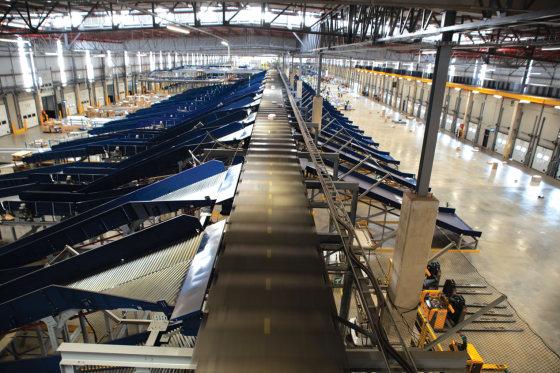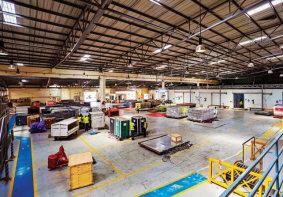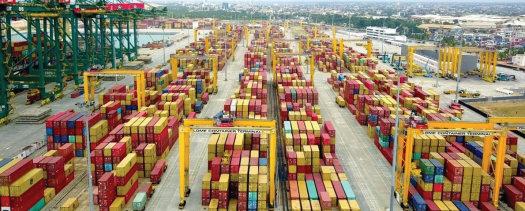
7 minute read
Logistics
Supporting Africa’s supply chains
The logistics sector’s return to normality has been marked by the adoption of innovations in order to maximise efficiency.
Image Credit: DSV
The onset of Covid-19 disrupted every facet of life and industry, and was felt keenly within the logistics sector. With lockdowns imposed and facilities closed or running at reduced operational capacity, warehouses and supply chains struggled to meet demand and the movement of goods was restricted. Since the peak of the pandemic last year, this sector has witnessed a slow return to normality as infections decline, however some trends born out of such troubled times are here to stay.
Before the pandemic began, the supply chain was already embracing new technological developments, such as the use of e-commerce and shopping online, which were being introduced to Africa. However the pandemic accelerated this techdriven revolution, with the advantage to working online and automatic operations apparent. According to the IFC, this has increased investment in technology such as IoT, cloud computing, automation, and data analytics as well as, in the longer-term, robotics, drones, and autonomous vehicles, all of which have the potential to enhance supply chain efficiency and reduce the exposure to labour shortages.
Trasnet, a South Africa logistics operator, was crippled by a cyber attack in July. Associated websites of the company were down for some time, internal systems were affected and equipment and information was damaged, forcing the company to switch to manual operations. The result was widespread disruption to certain goods in ports and constraints to warehousing were felt for some weeks after. While this is no cause for celebration, and perhaps should serve to highlight the importance of cyber security for all industries, it does indicate the reliance on technology within the supply and distribution sector and the importance of data and automotive technologies that are surely set to become a mainstay in warehouses across Africa.
DSV’s new centralised facility in South Africa.
The technological wave driving business
The benefits of introducing technological and digital innovations into warehouse services and supply chains are many and can serve to bring efficiency to business while reducing costs. For instance, according to Kardex Remstar, automated storage and retrieval systems can recover up to 85% of existing floor space when compared to standard shelving, can help solve labour challenges and manage unpredictable spikes in demands.
DSV is one such company that is leaning into this trend. Recently it consolidated its Guateng operations
in South Africa into a centralised facility, the largest of its kind in Africa. Situated near O.R. Tambo International Airport, with easy access to the East and West Rand, the logistics centre consists of approximately 130,000 sq m of buildings and covers supply chain solutions managed under one roof.
CEO of DSV Africa, Keith Pienaar, commented, “The inauguration of DSV Park Gauteng once again underlines DSV's strong commitment to South Africa and our will to grow the business in the region. DSV Park Gauteng consolidates several smaller offices and warehouses around Johannesburg into one large, modern logistics centre.”
“We have packed the new DSV facility with solutions such as an innovative sorter that can handle 13,000 packages every single hour. Throughout the whole building process, we have also utilised our global experience to construct buildings where sustainability and resource optimisation have been fundamental in all processes,” said Brian Almind Winther, EVP and head of Group Property, DSV.
The cross-dock sorter can handle 13,000 packages every hour. Image Credit: DSV
Field Intelligence
The effects of the pandemic were perhaps nowhere more firmly felt than within the medical industry itself. Field Intelligence recognised that Africa’s fragmented pharmaceutical supply chain frequently caused accessibility issues for patients and front line workers and has strived to implement a simple, data-led solution to support this supply chain.
To cut through these challenges with practical live data, inventory, the company developed Shelf Life in 2017. This technology-enabled platform helped to combat pharmaceutical shortages during the pandemic by using data analytics to optimise predictions and identify irregularities in the market to get ahead of and avoid impending disruptions for its members.
The ability of the system to do so was rewarded with membership increasing by 47% in Nigeria and 65% in Kenya and is a testament to the rapidly growing interest in such innovative solutions within the African supply chain and their ability to circumnavigate disruption. ■


Konecranes support container terminal in Togo
Lomé Container Terminal (LCT) S.A. in Togo has ordered five more Konecranes Rubber-Tired Gantry (RTG) cranes, to be delivered in the second half of 2022.
“LCT is a customer of long standing and I’m proud that LCT continues to trust our company and our technology. When these new cranes are delivered and commissioned, LCT will operate a fleet of 32 Konecranes RTGs. Today, there are over 200 Konecranes RTGs at work across West Africa,” said Antoine Bosquet, VP regional sales EMEA, Konecranes Port Solutions.
The Konecranes RTGs are identical to those already operated by Lomé. They are 16-wheel machines lifting containers 1-over-6, 7 containers wide plus truck lane, with container anti-sway provided by the Dynapilot system. They are fully electric Ecolifting machines powered by busbars and equipped with smart features Auto-steering and Stack Collision Prevention.
LCT is part of Terminal Investment Limited (TiL) which, since its founding in 2000, has become one of the largest terminal businesses globally.

Image Credit: Konecranes

There are more than 200 Konecranes RTGs at work across West Africa.
SWISSPORT RECEIVES FRESH CERTIFICATION IN KENYA
Swissport Kenya has been awarded the IATA CEIV Fresh Certification for perishable cargo, making it the only ground handler with this certification at Nairobi’s Jomo Kenyatta International Airport and the first ground services provider in sub- Image Credit: Swissport Saharan Africa to attain the The certification scope includes Swissport standard. Kenya’s Cargo Handling facility and Ground Services processes.
Nairobi is a major hub for perishables in East and Central Africa and perishables represent about 80% of cargo handled by Swissport in Kenya.
“In February 2020, Swissport’s operations in Nairobi were awarded with the IATA CEIV Pharma certification, establishing the first Swissport Pharma Center on the African continent. With the added CEIV Fresh certification, we are now very proud to offer our customer airlines a secure and certified cool-chain process across the board", commented Racheal Ndegwa, CEO of Swissport in Kenya. "With 27 years of experience handling perishable goods in Nairobi, this certification attests to the organisation’s robust, efficient and sustainable processes for handling perishable cargo.”
This recognition underwrites Swissport’s ambitions to ensure that delicate and short-shelf life products reach their final destination unspoiled and with minimal waste.
SEC Exports delivers 'wow factor' storage installation
SPONSORED CONTENT
SEC Exports Ltd has designed and installed a highly efficient storage solution for Fuji Oil, at their production facility in Ghana, using world-leading Dexion products to deliver a twotier shelving system with the addition of an independent mezzanine floor.
For Fuji Oil, Ghana, it was vital that the storage solution would meet a number of criteria including the provision of a flexible environment conducive to the storage of numerous plant spare parts of different sizes and weights, and improvement in the retrieval time of stored spare parts when needed, to minimise plant downtime. Additionally, the installation of this storage solution had to be a significant pre-requisite for rolling out a new maintenance management software solution, linking stock availability to maintenance activities.
In order to ensure minimal downtime of plant and machinery, often in remote locations, and maintain everyday operations, a significant range of expensive spare parts needed to be easily accessible. Therefore it was vitally important that the storage solution design should allow easy identification and retrieval of parts, as well as optimising the warehouse cube to ensure full usage of the available space, maximising the number of parts that could be stored.
SEC Exports analysed the range of product requirement for storage and designed a shelving solution to encompass the ground and first floors with over 100 bays of shelving, plus one aisle of Dexion pallet racking for additional storage of larger parts. The equipment and materials were delivered directly to the facility and installed by SEC’s local team, meeting the expectations of Fuji Oil for a well planned and executed project.
“It fits the global standard of Fuji Oil and everyone who comes in to see the installation says ‘wow!’” commented Prosper Ocloo, Engineering Manager, Fuji Oil Ghana. ■

The equipment and materials were delivered directly to the facility and installed by SEC’s local team.






